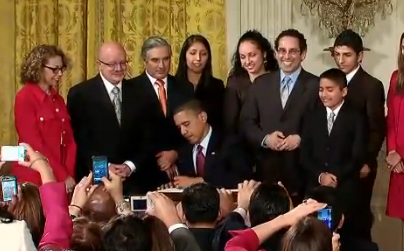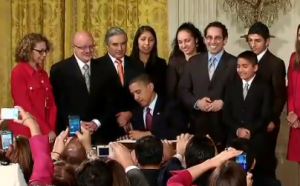Latinos Seek Broader Involvement in Obama Administration

 By Susana G. Baumann, Voxxi
By Susana G. Baumann, Voxxi
More than 11 million Latinos representing 10 percent of the electorate voted on November 6, showing ample consent for the incumbent (71 percent). Despite glooming forecasts, an additional 1.3 million Hispanics showed up at the voting polls since the last presidential election four years ago.
A tight race until the last minute, 2012 President Barack Obama’s re-election pivoted even more on Latino participation than the 2008 election. Despite the belief by many that Latinos’ concerns were centered on immigration reform (35 percent), polls around the country showed clearly that this community’s most important worries also included the economy and jobs (53 percent) and education (20 percent).
 With a grassroots, well-designed strategy that surely but steadily built support momentum, President Obama enticed and motivated a discouraged Hispanic electorate by including the new “deferred action” program for DREAMers and the renewal of the—unaccomplished—immigration reform promises.
With a grassroots, well-designed strategy that surely but steadily built support momentum, President Obama enticed and motivated a discouraged Hispanic electorate by including the new “deferred action” program for DREAMers and the renewal of the—unaccomplished—immigration reform promises.
The President even requested pressure from the community to pass immigration reform and other important legislation to ensure that Latinos finally access to the participation and representation they deserve in the economic and political life of the country.
So now, Latinos leaders are committed to take a stand in this Administration and claim what is theirs. This time, Latinos are not waiting for action. Latinos are determined to generate action.
Latino leaders take a stand
A well-known motto in Corporate Diversity and Inclusion practices states that “an organization is successful when it mirrors the markets it serves.” Government should not be an exception.
By mid-century, Latinos will comprise about 30 percent of the United States population, with 50,000 Latinos turning 18-years-old every month. Its economic power will grow faster than any other minority in the country to an estimated purchasing power of $1.5 trillion in the next three years.
Representing the community, a group of nationally recognized Latino organizations including the New America Alliance (NAA), the U.S. Hispanic Chamber of Commerce (USHCC), the National Council of La Raza (NCLR), the National Hispanic Leadership Agenda (NHLA), the Hispanic Association on Corporate Responsibility (HCR), the National Association of Latino Elected and Appointed Officials (NALEO), among others, and political and business leaders around the country are voicing the need for additional participation of Latinos in every aspect of the Obama Administration.
According to NALEO, 5,850 Latinos currently serve in elected offices nationwide, and in all levels of government; nine Hispanics serve in statewide offices, including the office of governor. NALEO has called the 113th Congress the “largest class of Latinos in the nation’s history.”
As much as we have shown progress, more needs to be done. Appointing new Latino leaders in key positions and promoting those who have shown extraordinary service to their country in past or present administrations will generate economic policies and trigger the trade and industry potential that is dormant in the community.
National Latino leaders involved in dialogues with people close to the Administration about the importance of Latino appointments—especially in agencies that dictate economic policy—include prominent leaders such as NHLA’s Chair Hector Sanchez, former Secretary of Housing and Urban Development (HUD) Henry Cisneros, Chairman Emeritus of The Smithsonian National Latino Board Henry Muñoz, past SEC Commissioner and NAA Chair Roel C. Campos; USHCC CEO Javier Palomarez, NCLR President and CEO Janet Murguía, and HACR’s CEO Carlos Orta.
Business leaders, especially in the area of finance and services, include Maria Contreras-Sweet (ProAmerica CEO), Manuel “Manny” Sanchez (prominent Chicago lawyer who co-led Latinos for Obama campaign), Monika Mantilla (President and CEO, Altura Capital and prominent advocate of building financial capacity in the Hispanic Community ) and Martin Cabrera (CEO Cabrera Capital, also prominent advocate of financial inclusion).
“NAA members are national business leaders who want to contribute to the solutions of large issues that affect the Latino community. We are concerned about building human capital (education and opportunities in business and government). We are also concerned about improving access to capital among our members and among the Latino community in the United States,” said to VOXXI Roel C. Campos, NAA Chair of the Board.
As Latinos are coming of age in political and market participation, the next most important piece is their economic and political empowerment. The fastest way to maximize their economic potential that arguably can resolve many education, healthcare, housing and employment issues is to create policies that would allow Hispanic small businesses to generate millions of new jobs and trillions of dollars in new business growth. But these results can only be achieved when policy makers not only bring their experience and knowledge in running government agencies but also the understanding of Hispanics’ needs, aspirations and desires.
“While (President) Barack Obama will lay out a broad agenda to move the country forward, his staff will actually undertake the hard work of implementation. Appointed officials have the power to set or influence the policies of the many federal departments and administrative agencies that make up the executive branch of government.” (National Hispanic Leadership Institute).
This article was first published in Voxxi.
Susana G Baumann is the Director of LCSWorldwide. A multicultural expert, a business blogger & a published author.
[Photo screenshot courtesy The White House]
